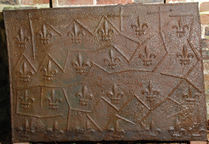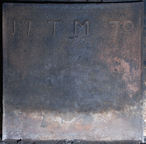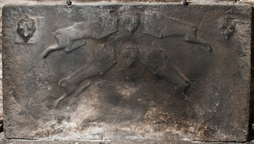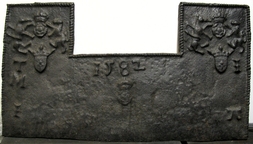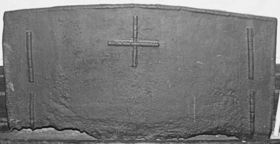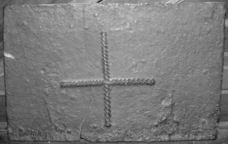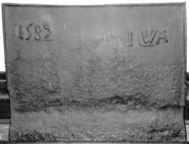-
311
Description: Quasi-rectangular; twisted rope edging (top and sides); fleur-de-lys stamp repeated 25 times in four rows (6-6-6-7), interspersed with a length of twisted rope repeatedly stamped between each row and sometimes between fleurs; three rope crosses near top corners.
Notes: The fleurs are identical to others from the ‘Pounsley’ series.
- Decoration tags:
- rectangular (shape)
- rope (edging)
- simple stamps
- carved stamps
- heraldic
- objects
Manufactured: in the mid- to late-16th century possibly at Pounsley Furnace, Framfield in the Weald area of England.
Current location: Nymans, Staplefield Road, Handcross, Slaugham, West Sussex, England.
(part of the National Trust museum group)
- Attached to series:
- Pounsley series
- Fleur-de-lys firebacks
-
101
Description: Rectangular; cavetto moulded edging; date aplit by intitials placed centrally at top.
Inscription: 17 TM 70
- Decoration tags:
- rectangular (shape)
- cavetto (edging)
- individual letters
- individual numbers
- text
Manufactured: in 1770 possibly in the Weald area of England.
Current location: in private hands, Hartfield, East Sussex, England.
- Attached to series:
- Date & initials firebacks
-
1240
Description: Rectangular shape; twisted rope edging (top and sides); top centre, crowned shield bearing initials KH above a fleur-de-lys between an angled leopard passant guardant sinister (on the left) and an angled leopard passant (on the right); the group repeated below at a steeper angle; in each top corner, a crowned shield bearing initials KH, above a fleur-de-lys, the left shield over pressed.
Notes: One of a large series employing distinctive Tudor heraldic stamps. The absence of one of the legs of the leopard passant indicates that this is an example of a later use of the stamp, earlier castings showing the stamp in more complete condition. The only examples of this fireback that have been noted are similarly poor copies lacking definition. Other examples are at Sackville House, East Grinstead and at Nymans, Handcross, both in Sussex.
Copies of this fireback are known.
Inscription: KH [x4]
- Decoration tags:
- rectangular (shape)
- rope (edging)
- simple stamps
- carved stamps
- heraldic
- royal
- text
- objects
Manufactured: in the mid- to late-16th century in the Weald area of England.
Current location: in private hands, Hartfield, East Sussex, England.
- Attached to series:
- Royal series
-
107
Description: Rectangle with two similar rectangular extensions at top extremities; rope edging (top and sides); on top extensions, two stamps of a dragon and lion supporting a rose and crown, each with a crowned shield bearing a fleur de lys below; central date with rose and crown below; initials TM vertically placed inside middle left edge, initial I middle right; initials I and A, respectively, at lower left and right.
Notes: The initials, TM and I, may relate to a married couple, the first two letters to their first names and the last to their surname; the initials IA are likely to be of the founder as they appear in the same arrangement on other firebacks. The unusual shape would probably have been determined by the structure of the hearth for which it was made; the rose and crown and supporters stamp can also be seen on a large fireback, dated 1593, formerly at Baynard's Park, Surrey (no. 200); the date and IA stamps can be seen, in identical form, on a fireback in the Victoria & Albert Museum, and on two other firebacks, suggesting a common source for all of these firebacks.
Inscription: TM 1582 I / I A
- Decoration tags:
- rectangular with two arches (shape)
- rope (edging)
- carved stamps
- individual letters
- individual numbers
- heraldic
- royal
- text
Manufactured: in 1582 possibly at Pounsley Furnace, Framfield in the Weald area of England.
Current location: Haslemere Educational Museum, Haslemere, Surrey, England.
Museum number: 8582 (part of the Haslemere Educational Museum museum group)
Citation: Anon., 1929, 'An interesting fireback', Sussex Notes and Queries, 2, 8 , p. 242.
- Attached to series:
- 1582 IA series
- Pounsley series
-
108
Description: Quasi-rectangular with narrow arches at top ends and a broad low central arch, between which are flat-topped peaks linked to the arches by shallow concave curves; flanged edge (top and sides); mirroring the edge a channel has been engraved into the metal, extending into the small arches, producing the effect of a wide fillet along the top and sides with an inverted U-shaped return into the end arches; within the channel, at each end, a primitive representation of a vertical, hollow plant stem and four mirrored pairs of curved branches, with a vertical channel parallel to the edge joining the branch ends on the inside; between these is cast a small, rectangular panel with ovolo edging, bearing a full achievement of the arms of the Worshipful Company of Clothworkers; the date is centrally placed above this panel.
Notes: An usual fireback for several reasons: the use of engraving for significant elements of the design, the flanged edge, and the incorporation of a small fireback. The Clothworkers’ arms: Sable a chevron ermine between in chief two Havettes Argent and in base a Teazel Cob Or; crest: on a Mount vert a Ram statant Or; supporters: two Griffins Or pellettée; the arms as displayed were granted in 1587. An example of the armorial fireback on its own is in Petworth House (no. 522).
Inscription: WV 1659 WV
Arms: Worshipful Company of Clothworkers
- Decoration tags:
- rectangular with three arches (shape)
- flanged (edging)
- composite
- individual numbers
- planklines
- armorial
- text
Manufactured: in 1659 in the Weald area of England.
Current location: Haslemere Educational Museum, Haslemere, Surrey, England.
Museum number: 8587 (part of the Haslemere Educational Museum museum group)
- Attached to series:
- Composite firebacks
- Livery company firebacks
-
112
Description: Rectangular with twisted rope edging; straight lengths of rope re-stamped to make longer lengths in the shape of a saltire on each side and a 'V' in the middle.
Notes: The arrangement of the rope lengths may have an apotropaic significance, a double 'v' alluding to the Virgin Mary. Formerly part of the Ade Collection (from Grove Hill, Hellingly, Sussex).
- Decoration tags:
- rectangular (shape)
- rope (edging)
- simple stamps
- apotropaic
- objects
Manufactured: in the mid- to late-16th century in the Weald area of England.
Current location: Hastings Museum and Art Gallery, John's Place, Bohemia Road, Hastings, East Sussex, England.
Museum number: HASMG: 1952.51.20 (part of the Hastings Museum museum group)
- Attached to series:
- Rope design firebacks
-
114
Description: Quasi-rectangular shape with low-curved convex top; edging (top and sides)formed of lengths of dowel grooved laterally and helically; upper centre, cross formed of the same dowel; at each side, tandem arrangement of longer dowel, similarly grooved.
Notes: The base board appears to be the same size and shape as that of a fireback at Plaxtol, Kent (no. 587), which also has the same edging; and the grooved dowels are also on a fireback with dagger stamps at Lewes; the cross will have been intended to have apotropaic significance. Formerly part of the Ade Collection (from Grove Hill, Hellingly, Sussex).
- Decoration tags:
- rectangular (shape)
- grooved dowel (edging)
- simple stamps
- apotropaic
- objects
Manufactured: in the mid- to late-16th century in the Weald area of England.
Current location: Hastings Museum and Art Gallery, John's Place, Bohemia Road, Hastings, East Sussex, England.
Museum number: HASMG: 1952.51.21 (part of the Hastings Museum museum group)
- Attached to series:
- Grooved dowel series
-
115
Description: Plain rectangular plate with cross formed of a single length of twisted rope placed twice.
Notes: Despite the simple form, the likely Christian symbolism is very evident. Formerly part of the Ade Collection (from Grove Hill, Hellingly, Sussex).
- Decoration tags:
- rectangular (shape)
- none (edging)
- simple stamps
- apotropaic
- objects
Manufactured: in the 16th century in the Weald area of England.
Current location: Hastings Museum and Art Gallery, John's Place, Bohemia Road, Hastings, East Sussex, England.
Museum number: HASMG: 1952.51.17 (part of the Hastings Museum museum group)
- Attached to series:
- Rope design firebacks
-
116
Description: Rectangular; twisted rope edging (top and sides); top left, date carved on block; top right, individual letter 'I' followed by 'WA' carved on block.
Notes: The same date stamp appears on a group of multi-facetted, arched firebacks bearing the crowned Tudor arms within a Garter. Formerly part of the Ade Collection (from Grove Hill, Hellingly, Sussex).
Inscription: 1589 I WA
- Decoration tags:
- rectangular (shape)
- rope (edging)
- carved stamps
- date stamp
- text
Manufactured: in 1589 in the Weald area of England.
Current location: Hastings Museum and Art Gallery, John's Place, Bohemia Road, Hastings, East Sussex, England.
Museum number: HASMG: 1952.51.42 (part of the Hastings Museum museum group)
- Attached to series:
- 1589 series
-
117
Description: Rectangular with triangular pediment; stepped fillet and ogee moulded edge to pediment; twisted rope sides; date in portico; medallion with dog crest stamped twice in top left and right corners.
Notes: It may be that the date and portico form a separate panel, as the position of the date appears to be the same on the three known castings where it is found.
Inscription: 1586
- Decoration tags:
- triangular arched (shape)
- rope (edging)
- carved stamps
- date stamp
- text
- animals
Manufactured: in 1586 in the Weald area of England.
Current location: Hastings Museum and Art Gallery, John's Place, Bohemia Road, Hastings, East Sussex, England.
Museum number: HASMG: 1917.196.5 (part of the Hastings Museum museum group)
- Attached to series:
- 1586 series
